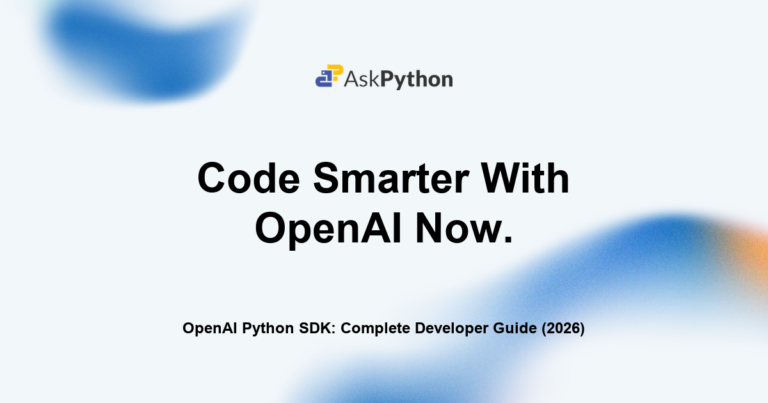The bound method error in Python occurs when there is some problem with the function call in your code. Initially, there were two types of function calls in Python, bound and unbound. When Python was updated to Python 3, the unbound method was removed to make function calls smoother and easier to execute and to avoid unnecessary errors.
There is not much information about why this feature was changed during the evolution of Python, but there is a significant difference between the two function calls.
In this article, we will find out the possible causes of the “bound method” error and how we can fix it.
The ‘bound method’ error in Python generally occurs when a method call is missing parentheses. This error was more prevalent in Python 2, but Python 3, by default, assumes all functions as bound methods. Ensure to use parentheses when calling functions to prevent such errors.
Exploring Bound Methods in Python
When a class or method is associated with an object it is called a bound method. They are also called instance method because they have a instance associated with them. These classes need arguments when they are defined.
BY default, their first argument is self. They can be influenced by the state of the instance. When methods are called on instances, they have access to the data of the instance they are called on.
In Python 3, all functions are by default bound functions. Even when not mentioned, the self object is passed as the first argument to the __init__ method during the instance initialization in Python. To know more about initialization files, click here.
For example, let’s say we have a fruit class, the various attributes of the fruit are going to be its name, color, price etc.
Let’s take a look at how to create user defined classes in Python.
# defining a fruit class here
class fruit:
# initialization function
def __init__(self, name, price, color):
# three parameters name, color, price
self.name = name
self.price = price
self.color = color
# function for only displaying price
def pricefruit(self):
print("The price of ", self.name, "is= ", self.price)
# function for only displaying name
def namefruit(self):
print("The fruit you entered is= ", self.name)
# function for only displaying color
def colorfruit(self):
print("the color of ", self.name, "is= ", self.color)
# function for displaying everything
def displayall(self):
print("The fruit is=", self.name)
print("It's color is=", self.color)
print("It's price is= ", self.price)
# driver code
# taking user input
name, color, price = input(
"enter the name of the fruit, it's colour and it's price per kilo separated by a comma respectively= "
).split(",")
# calling our class instance
fruits = fruit(name, price, color)
# calling the display all function
fruits.displayall()
print("All the features individually are:")
# calling the price function only
fruits.pricefruit()
# calling the name function only
fruits.namefruit()
# calling the color function only
fruits.colorfruit()
This is our class fruit. It is an example of object oriented programming in Python since the object is defined by various features such as it’s color, price and name.
This is a very basic example of a user defined class, as you move ahead in your programming journey you’ll come across many such classes and will also create them! This is one of the biggest advantages of Python being an object oriented programming language with one of the most easiest syntax.
The output would be:
enter the name of the fruit, it's colour and it's price per kilo separated by a comma respectively= pomegranate,red,130
The fruit is= pomegranate
It's color is= red
It's price is= 130
All the features individually are:
The price of pomegranate is= 130
The fruit you entered is= pomegranate
the color of pomegranate is= red

Read more about Python Classes and Objects here!
Root Cause of Python’s ‘Bound Method’ Error
Since all of the functions in Python 3 are bound instances by default, you cannot declare unbound or static methods. The “bound method” error arises when you forget a pair of round brackets or a pair of parentheses at the end of the function name.
This was a very common error in Python2, but nowadays in some editors the function calls work with the missing parentheses. Nonetheless, it is a good practice to include the pair of round brackets after declaring a function call to keep unnecessary errors at bay.
In other languages which are much more rigid than python, a missing parentheses will definitely raise an error leading the program to go through their code over and over again wasting precious time.
Since it is not so obvious as a error, it might confuse you for a minute because it might just say something like the one shown below:
<bound method fruit.namefruit of <__main__.fruit object at 0x108534080>>
Proven Fixes for the ‘Bound Method’ Error
The easiest fix to this is to practice putting parentheses when calling function, since it mainly comes down to the syntax knowledge of the programmer and their code structure. Instead of writing, fruit.namefruit for calling the function, practice writing fruit.namefruit() .
Note: in some IDEs this error has been removed completely and function calls even work when the pair of round brackets in missing. But to be on the safe side and to inculcate a habit of good coding, use the parenthesis whenever you call a function.
It can be also fixed using the try and except block as we do with any other exception handling. But you should avoid doing this because this doesn’t in itself solve the problem but rather suppress it.
try:
fruit.namefruit
except AttributeError:
print("Please put parenthesis at the end of function name!")
Warning:- This try and except method might not be feasible on all systems and you might encounter the same thing over and over again or it might lead to more errors. Hence to avoid the error and to avoid writing extra, unnecessary code, just use parenthesis, the exception handling is not required at all. Practice writing clear and precise code with comments beside every line in order to easily debug it in the future.
In a Nutshell: Bound Methods in Python
Bound and unbound methods have long been merged into one after Python2 got upgraded to Python3. Nowadays, only bound methods exist in python which refers to a default object association when a function is defined in this programming language. It is usually done via the self parameter, most of the time invisible when the function is called. To avoid getting weird bound method addresses as mentioned in the above section, always use parentheses. It is good programming practice. What other minute syntactical details do you think can be considered as good programming practices?



